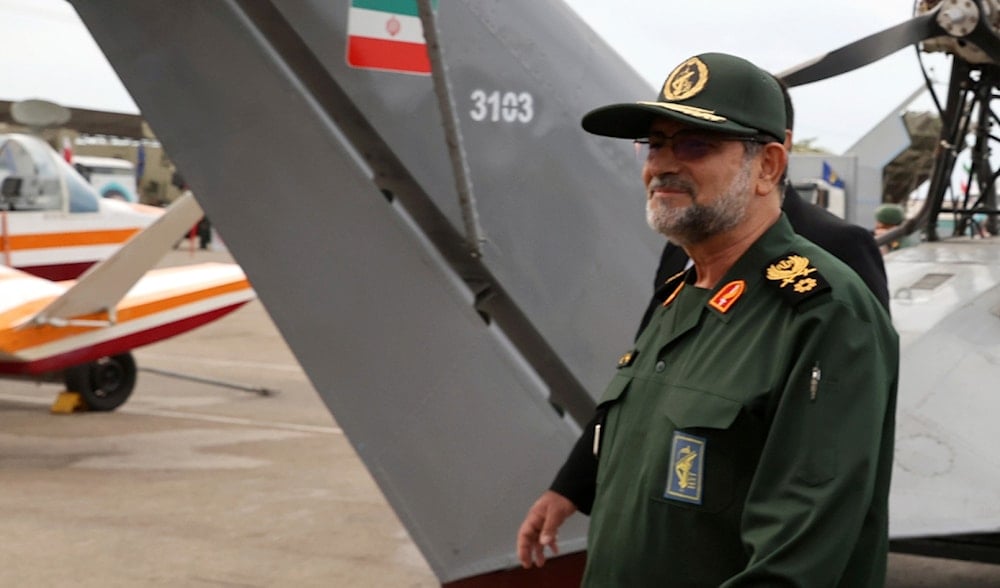Iran pledges to keep Hormuz open, blasts foreign military presence
Rear Admiral Tangsiri says Iran has safeguarded the Strait of Hormuz for decades and warns that pressure on oil exports could change strategic decisions.
-

In this photo released by the Iranian Presidency Office, IRGC navy commander Alireza Tangsiri is seen in the southern port city of Bandar Abbas, Iran, Friday, February 2, 2024. (Iranian Presidency Office via AP)
The commander of Iran’s Islamic Revolution Guards Corps's (IRGC) Navy stated that the Strait of Hormuz has always remained secure under Iran’s protection, emphasizing that the country has never sought to close the strategic waterway, despite persistent foreign provocations.
Rear Admiral Alireza Tangsiri described the strait as the “world’s vital oil and gas artery,” highlighting its central role in the global energy supply chain. He warned, however, about the “unregulated” presence of extra-regional military forces, particularly those operating nuclear-powered vessels, in the Gulf.
“This waterway is the oil and gas artery of the world, and Iran has always safeguarded it and never sought to have it closed,” Tangsiri said. “The question remains: is it fair that the world benefits from this strait while Iran does not?”
The IRGC Navy chief added that any decision regarding the Strait’s status, whether to keep it open or to restrict passage, rests with Iran’s top leadership and is directly linked to the level of pressure imposed on the country’s oil exports.
“The decision on whether the strait remains open or closed ultimately rests with the country’s top leadership and depends on the extent of pressure exerted on Iran’s oil exports,” he said.
Western powers fuel instability
Tangsiri further accused certain foreign powers of intentionally fueling regional instability to justify their military presence. “They deliberately create tensions and adversaries to legitimize their deployment,” he stressed, asserting that Iran’s defense doctrine is defensive in nature, not aggressive.
“The Islamic Republic of Iran has not attacked any country in over 300 years and will not seek conflict unless it is provoked. However, it will resolutely defend its interests,” he stated.
He also emphasized the vigilance and high readiness of Iranian naval forces stationed in the Gulf, affirming that both the IRGC Navy and the Army Navy will resist any threat to national interests.
“They will stand against any threat or action targeting national interests and defend the nation’s dignity until their last breath,” he said.
Referencing the recent 12-day Israeli war on Iran, Tangsiri reiterated Iran’s defensive stance.
“We did not start the war, nor did we request its end,” he said, reaffirming Tehran’s commitment to self-defense.
Tangsiri also dismissed longstanding claims that Iran is pursuing nuclear weapons. “The enemies know that Iran is not seeking a nuclear bomb; their problem is with Iran’s independent existence and scientific progress, not with weapons,” he emphasized.
Iran warns against foreign interference in the Gulf, vows response
On Wednesday, Iranian officials issued stern warnings to foreign powers over threats to the Gulf, Iran’s strategic islands, and the Strait of Hormuz, emphasizing the country’s readiness to respond decisively to any miscalculations.
Speaking in Parliament, Iranian Speaker Mohammad Bagher Qalibaf condemned what he called “interventionist and baseless claims” from the Gulf Cooperation Council (GCC) and European Union foreign ministers, particularly regarding Iran’s three Gulf islands. He underscored that Iran’s territorial integrity will not be compromised under any circumstances.
Adding to the warnings, Commander of the Islamic Revolutionary Guard Corps (IRGC) Major General Mohammad Pakpour marked IRGC Navy Day by highlighting the force’s readiness and deterrent capabilities. Pakpour described the IRGC Navy as a symbol of “strong faith, intelligent resistance, and deterrent power,” capable of defending Iran’s long-term security across the Gulf and surrounding waters.
“Any miscalculation by them [enemies] in the Persian Gulf, the Strait of Hormuz, or Iran’s islands will be met with a decisive, immediate, crushing, and regret‑inducing response,” Pakpour said.
He emphasized the IRGC Navy’s preparedness across surface and subsurface warfare, missile systems, unmanned platforms, electronic warfare, and cyber capabilities, asserting that these strengths ensure regional stability while deterring foreign interference.
Read more: Iran to respond as US moves to target commercial shipping: Source

 4 Min Read
4 Min Read








